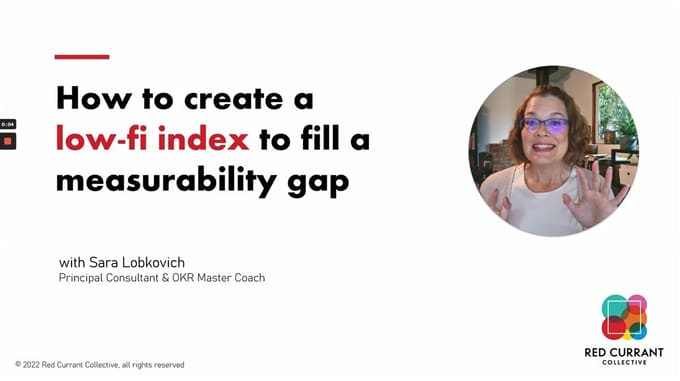Hi all!
I love doing Live Q&As — after I get through the tech jitters, I get to help people by answering their real-world questions, and very few things in my work are more fun than that. In a recent multi-channel AMA-style live, I missed a really killer question:
“How do you foresee generative AI helping in strategic planning and the creation of OKRs?”
I recorded a follow-up answer, so you can watch the video above, and I’m including the transcript below if you’re a reader, not a video person!
Hello and welcome. I’m Sara Lobkovich, Strategy Coach and Objectives and Key Results Activist. Today, I’m answering a question from my recent livestream that I wasn’t able to answer live: ” How do you foresee generative AI helping in strategic planning and the creation of OKRs?”
This is a super juicy question since there’s a lot happening and there’s a lot of momentum in this space around this specific question. Leading OKR platforms, for example, are rolling out integrations with the large language models to help make creating Objectives and Key Results easier and faster, and more automated.
“Generative AI” tools like ChatGPT and other large language models are good at the “known.”
I will say I was an early adopter of ChatGPT and now Microsoft Copilot since I saw the potential right away to use the models for reducing some of my cognitive overhead around certain tasks, like summarizing content.
The thing to remember is that generative AI, when it’s not hallucinating, is good at giving an answer about what it’s trained on. It can be helpful for answers about fairly discrete known scenarios that it might have been trained on. You always have to watch out for the ‘garbage in, garbage out’ problem.
I’ve personally trained models on the structures that I use for Objectives and Key Results, and when I’m creating goals around more known areas of business life, sometimes I use the models to create a rough draft or an example, and that saves me time on the initial cognitive overhead of coming up with the first ideas. For some purposes, it gives me enough of a start that it’s worth the time of using the model versus just writing from scratch myself. I’d say best case if I’m writing a new set of example OKRs for a scenario, the generative AI tools get me about 30 percent of the way there, and then I can do the other 70 percent with less internal resistance because I’ve got a starting place.
[00:02:09] Generative AI can be helpful in those known territories or in familiar landscapes.
Be wary of the IP implications of using large language models for strategic planning.
I don’t use generative AI tools for actual client work or for client goal-setting or scenarios. I’m a lawyer, so even with careful reading and understanding of the platform’s terms of use, I don’t entrust client information to those models. I’m also careful with how much of my own IP I train the models on. There’s the IP and information security risks that really are the wild, wild west.
But also, for the creation of real, actual, not example, OKRs, outside of a few incremental maintenance, kind of parts of the business, I don’t really find much utility in the models. The models are only as good as their training, so they’re helpful for scenarios that are more commonplace and more mainstream. Every client I work with has some areas where they’re focused on that kind of mainstream, incremental change. Every company has a legal team. Every company has IT. Every client I work with has some areas of the business where they’re focused on incremental change, like around core business operations.
ChatGPT and other generative AI tools are not as helpful in unknown, speculative, or experimental areas of business.
But every client who chooses to work with me is also focused on more than incremental change. They have a transformation imperative or need to take big risks in order to make significant change and impact. When we’re stepping into uncertain or unknown territories—so think hyper-growth, innovation, transformation. That’s where I don’t bother with generative AI since the models just aren’t trained to guide us well in unknown or uncertain territories or in speculative or experimental realms.
ChatGPT OKRs may in some situations be better than nothing.
[00:03:58] There are some organizations that just want to have Objectives and Key Results, and anything is better than nothing. In that case, you might be able to ask ChatGPT or Copilot to create Objectives and Key Results for you and find that what it generates is better than nothing.
The downside of asking those models for examples is that then you might spend more time trying to emulate or implement the example than really examining what’s most important locally within your organization right now and in this goal cycle.
But when you need OKRs to really change things, emulating an example doesn’t help you: asking and answering hard questions, together, does.
The organizations I work with need more than just something in their OKRs.
The goals they create and are working to achieve are based deeply on their organization’s purpose and their most important outcomes:
“What’s most important to achieve and why does it matter?”
and those questions can only be meaningfully answered by humans at this point, because the models aren’t trained on the ins and outs of your organization’s leadership, talent, customers, operations, stage, market, what’s going on in your world, what you’ve already tried, what’s failed, what’s worked, what succeeded.
[00:05:13] OKRs that really change things are about what’s really most important to achieve, and your theory about what it might mean to make measurable progress or what outcomes might be incredible to achieve if everything goes right.
That’s the realm of human inspiration and aspiration, not machine learning.
The process of creating No-BS OKRs that actually change things and make an impact is a messy human process of noticing and organizational truths and facts and observations and human insights and ideas.
And the process of creating OKRs is not just about setting goals.
It’s about fostering collaboration, those conversations, engaging in the tough back and forth to whittle your possibilities down to what’s ultimately most important now and in this goal cycle, and to ensure that your OKRs align to your strategic priorities.
What’s most important when creating organizational OKRs intended to actually drive outcomes is not the rote creation of goals.
What’s most important is that messy back and forth, the conversations and alignment efforts that take place to actually make meaning together, and that job for now, can only be done by humans.

Hi, I’m Sara Lobkovich!
I help change makers and status quo challengers set clear goals, stay focused, and build cultures of growth and high performance.
For more information:
-
Join my newsletter for a weekly reminder to stay focused on what’s actually most important
-
And drop me your questions about goals, Objectives, and Key Results, and career fulfillment for you Rebelutionary leaders and Thinkydoers.
Do you want to feel more confident, capable, and less frustrated with your work-life?
Or, are you a leader who needs help inspiring your team to deliver the performance you need?
And, do you like saving money? 🤣
If so, join my email list right now (today). I have an exciting one-time, limited-time only offer that is ONLY available to my mailing list, and it’s not too late to join in (but it will be soon)! Subscribe using the form below, and check your email for more info!
JOIN THE WAITLIST Built with ConvertKit
.jpg)

